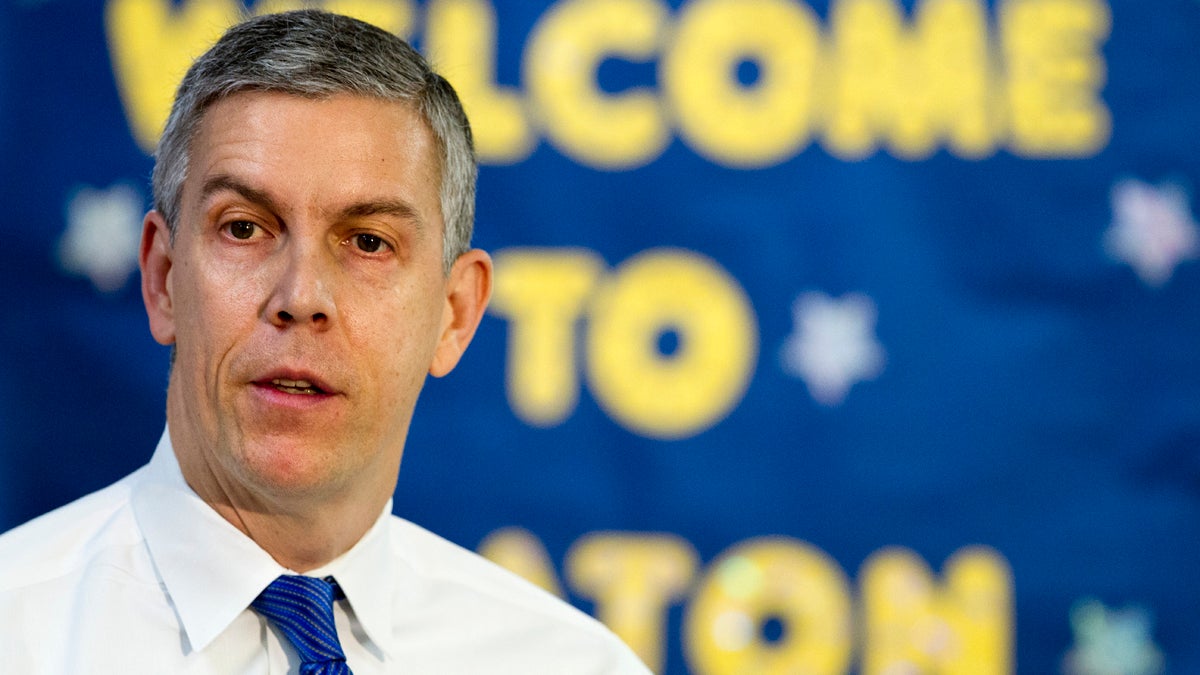Commentary: Standardized testing opponents find themselves on the wrong side of civil rights

Education Secretary Arne Duncan speaks about the administration's priorities for education, Monday, Jan. 12, 2015, at Seaton Elementary in Washington. (AP Photo/Jacquelyn Martin)
On Monday U.S. Secretary of Education Arne Duncan outlined his wish-list for the next iteration of No Child Left Behind. It will be the seventh generation of the Elementary and Secondary Education Act (ESEA), which began in 1965.
Duncan again emphasized the administration’s support for mandatory standardized testing of children in grades three through eight.
The anti-testing cadre gave a collective hiss on the internet. Nothing new there: opposition to annual standardized student assessments is the new craze. But, remarkably, sloganeers of “toxic testing,” including teacher union leaders and suburban parents, find themselves at odds with some of America’s most prominent civil rights groups.
From a statement issued earlier this month from an umbrella group called The Leadership Conference on Civil and Human Rights”
Much progress has been made, but educational inequality continues to quash dreams, erode our democracy, and hinder economic growth. This federal role must be honored and maintained in a reauthorized Elementary and Secondary Education Act (ESEA).”
This call for educational equity is followed by a list of six items that civil rights leaders deem critical to the reauthorized ESEA. The second item on the list, one emphasized by Sec. Duncan in his speech, is “annual, statewide assessments for all students (in grades 3-8 and at least once in high school) that are aligned with, and measure each student’s progress toward meeting, the state’s college and career-ready standards.”
Signatories include including the American Civil Liberties Union, National Association for the Advancement of Colored People, The United Negro College Fund, the Leadership Conference on Civil and Human Rights, the National Center for Learning Disabilities. La Raza, and the National Urban League
Now, it’s not that hard to figure out reasons for objections to annual standardized testing. Tea Party-leaning conservatives – Senator Rand Paul and the like — have long disdained federal interference in state education policy, and it’s no surprise to find them unsympathetic to federally-mandated student assessments.
Teacher unions exist to protect members’ job security and benefits, and are understandably hostile towards objective accountability metrics. Suburban parents who send their children to great schools worry about the psychological stress of over-testing and whether an untoward focus on assessments can inhibit classroom instruction.
But, among all the aspects easy to dislike about ESEA – punitive sanctions, impossible benchmarks (all children will be proficient in language arts and math by 2014!), relentless bookkeeping – its most important contribution is the disaggregation of student achievement data. In other words, schools can’t rely on “average” student achievement to signal success, but must report test scores by race, economic status, zip codes, English fluency, and disability. Kati Haycock of Education Trust says, “Kids who are not tested end up not counting.” Annual testing means that everyone counts.
Yet AFT President Randi Weingarten denounces “the “test-fixation that was put in place with NCLB, allowing sanctions and consequences to eclipse all else, ” NEA President Lily Eskelsen Garcia “sounds the alarm on the toxicity of the standardized testing mania,” A spokeswoman for an anti-testing rally in Buffalo, NY explains, “This is why you see a lot of suburban parents here tonight. They’re all being treated poorly. They’re mad about these tests.”
Opponents of annual testing are on the wrong side of this issue. Their philosophical and political clash with the nation’s primary civil rights groups may, for the moment, play well with constituents, but this stance will compromises their credibility. It’s one thing to worry about whether time spent on student assessments crowds out instructional time. It’s another thing to undermine fifty years of efforts to provide all students with access to equitable education systems. Advocating for the removal of mandatory annual testing from ESEA creates the perception that teacher unions and suburban parents, and even the Rand Pauls of this world, value political expediency over the urgent educational rights of disenfranchised children.
________________________________________________
Laura Waters is vice president of the Lawrence Township School Board in Mercer County. She also writes about New Jersey’s public education on her blog NJ Left Behind. Follow her on Twitter @NJLeftbehind.
WHYY is your source for fact-based, in-depth journalism and information. As a nonprofit organization, we rely on financial support from readers like you. Please give today.





